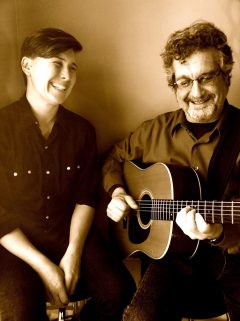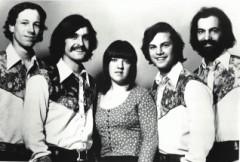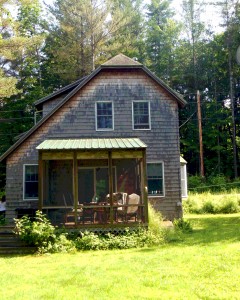Tales From The Road
Willa Mamet and Paul Miller Bring their Brand of Americana to San Diego

Paul MIller and Willa Mamet

Coco & the Lonesome Road Band in the early 1970s. Coco, center; Paul Miller, second from left.

Vermont house. Photo by Liz Abbott.
Not too long ago (beginning in 2001 when the Coen Brothers movie O Brother Where Art Thou? was a runaway hit) a new genre of music rose from the ashes of the singer-songwriter Jurassic: Americana, inspired by the soundtrack to the movie and by the music of rising stars like Gillian Welch and Alison Kraus (and helped along by the genius and excellent taste of producer T-Bone Burnett) originally featured newly recorded versions of Depression-era classics from the American South. The sound, full of classy banjo and mandolin licks and lush vocal harmonies, has seduced literally hundreds of youngsters, who first added mandolin and banjo accompaniment to their original songs, and then (hallelujah) actually took the time to seek out, and be inspired by, more roots recordings from the early 20th century.
To add some confusion to the mix, the term “Americana” was already in use before 2001. It has also been used to describe a radio format and genre since the mid-1990s, when it was coined by music executives Rob Bleetstein in San Francisco and Jon Grimson in Nashville, and was used to name the Americana Music Association (AMA), “a professional not-for-profit trade organization whose mission is to advocate for the authentic voice of American roots music.” It’s interesting to note that singer-songwriters like John Prine and Steve Earle are included by the AMA in their roster of designated Americana artists, as are the Grateful Dead, Bruce Springsteen, Duane Eddy, and Tiny Tim. Small wonder when asked exactly what is meant by Americana, six of your average music lovers are liable to give you seven answers.
Which brings me to Willa and Paul, and to the lovely music that they make together.
Oakland-based Renaissance woman Willa Mamet and ace Vermont guitarist and harmonist Paul Miller have known each other since Willa was a little girl in Vermont and Miller was a visiting family friend. Once upon a time they discovered that wonderful things began to happen when they tried to sing together. And so it began.
Willa Mamet is a busy woman, and an accomplished one in many styles. Bodyworker. Photographer. Crafter of hand-carved mezuzahs and other sorts of folk art Judaica. And now a folk diva. In her collaborations with Paul Miller, Willa stakes her claim by hunkering down and proceeding to sing the bejesus out of every song. Paul Miller, whose day job (in the Green Mountain State, “Moonlight in Vermont” is more than a schmaltzy anthem: it’s a necessity for just about anyone intending to make a “living” as a musician) is the coordinator of a workforce project for a mental health services agency in central Vermont, provides classy pared-down guitar and vocal accompaniment that turns out, somehow, to always sound lush and right. Miller has been providing guitar and vocal harmonies for a wide collection of acoustic groups since before Willa Mamet was born. He is currently one of six featured vocalists in the Bluegrass Gospel Project (a stellar acoustic combo from New England that you may not have heard of, but should try and seek out), and spent years before that as an indispensable member of Breakaway and for Coco (half of the duo Coco and Lafe, here in San Diego) and the Lonesome Road Band, two other favorite Vermont combos. Miller has a sweet voice that seems custom-made for harmony singing.
On Willa and Paul’s new recording, currently in process, Miller’s solo singing can also be enjoyed on verses of Kenny Roger’s classic “The Gambler” and on George Strait’s “The King of Broken Hearts,” but the stars really begin to shine, on stage and on disc, when these two harmonize.
The dozen songs that have been chosen as the bill of fare for Let Somebody Love You*, Willa Mamet and Paul Miller’s second recording project (their first, a lovely 8-track EP titled East Hill Road, was produced in 2013) could just as easily be titled “Willa and Paul Play You Some More of Their Favorite Songs from Many Sources.” Their widely varied menu includes favorites like Joni Mitchell’s “River,” Old Crow Medicine Show’s version of “Wagon Wheel,” and Richard Thompson’s “Dimming of the Day” (Bonnie Raitt’s version, not Linda Thompson’s!).
The fact that Paul is considerably older than Willa has turned out to be a plus for this ongoing musical project: The two singers have introduced each other to many of their own favorites, and that list includes 40+ years of American popular music. (Willa, by the way, says that the best thing about Paul being older is that he gets them the AARP discount when they stay at hotels on tour!)
And that takes us right back to that Americana thing… trying to identify what constitutes “authentic roots music” is almost as futile as arguing over the definition of “folk music” (wasn’t it Leadbelly who said, “It’s all folk music, performed by folk — I don’t hear any horses singing it!”). The ability to choose classic material, and to arrange it so that people can appreciate it, either “all over again” or for the first time, is an art, and, just like “You Are My Sunshine” and “Don’t Fence Me In” and dozens of other popular American songs familiar to almost everyone a few generations ago, this music deserves to be preserved, and celebrated, and performed. Willa Mamet and Paul Miller have exactly what it takes to get the job done, and the pleasure is in the delivery — at their best, Willa Mamet and Paul Miller invite you into that Vermont kitchen when they first found musical magic so many years ago. Come listen to some fine music masterfully played and sung.
* Reviewed in this issue.
Willa and Paul will be performing twice at Adams Avenue Unplugged this month (during a rare California tour) on Sunday, April 25, first at 1pm in the Normal Heights United Methodist Church and again at 3pm at the Kensington Cafe.










